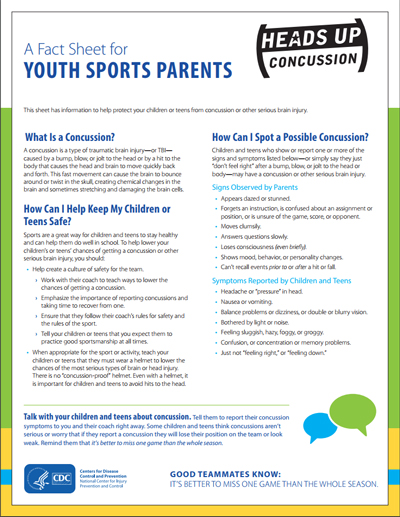September is a month full of sports. Football, baseball, and soccer are in full swing. Playing sports is a great way for kids to learn the value of teamwork, but injuries can occur. This month, we’re focusing on concussions. While we can’t always prevent injuries, we can take steps to recognize potentially unseen injuries that can have long-term consequences for those we love most.
What is a concussion?
According to the Centers for Disease Control & Prevention (CDC), a concussion is “a type of brain injury caused by a bump, blow, or jolt to the head or by a hit to the body that causes the head and brain to move quickly back and forth.” [1] A hard hit in football, an errant pitch in baseball, a dangerous header in soccer: They can all potentially cause a concussion to occur.
Below is a quick video that shows how a concussion occurs:
Know concussion signs and symptoms
Because you can’t “see” a concussion, it may be hard to know if a player experienced the traumatic brain injury like we saw in the video above. We can, however, look for certain signs and symptoms that give us a clue that a serious injury has occurred. From the CDC [2], these include the following:
Concussion signs
- Can’t recall events prior to or after a hit or fall.
- Appears dazed or stunned.
- Forgets an instruction, is confused about an assignment or position, or is unsure of the game, score, or opponent.
- Moves clumsily.
- Answers questions slowly.
- Loses consciousness (even briefly).
- Shows mood, behavior, or personality changes.
Concussion symptoms
- Headache or “pressure” in head.
- Nausea or vomiting.
- Balance problems or dizziness, or double or blurry vision.
- Bothered by light or noise.
- Feeling sluggish, hazy, foggy, or groggy.
- Confusion, or concentration or memory problems.
- Just not “feeling right,” or “feeling down.”
Get to know the HEADS UP program
The CDC has developed an amazing HEADS UP program, with a ton of information for parents, players, schools, and more. [3] Here at Horizon Family Medical Group, we strongly encourage you to take some time on these websites, involve your kids and their coaches, and make sure your kids stay safe and have fun.
Some great HEADS UP resources
Resources
- https://www.cdc.gov/headsup/basics/concussion_whatis.html
- https://www.cdc.gov/headsup/basics/concussion_symptoms.html
- https://www.cdc.gov/headsup/
- https://www.cdc.gov/headsup/pdfs/youthsports/parents_eng.pdf


